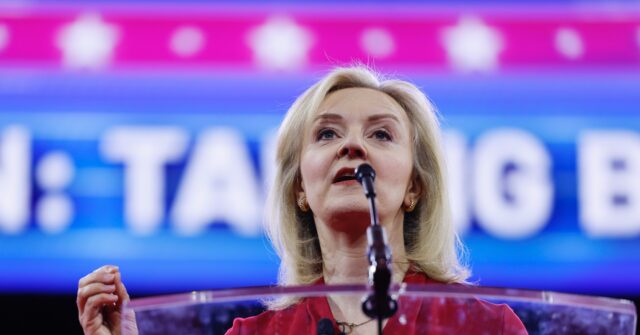In a recent interview with Fox Business, former British Prime Minister Liz Truss articulated a strong critique of the economic strategies employed by the UK and European Union, advocating for a pivot towards the policies championed by former U.S. President Donald Trump. Truss highlighted the potential for “economic doom” if these governments persist with what she terms “failed leftist-globalist agendas.” She underscored the high energy prices and taxes currently besetting these regions, claiming they are the highest in seventy years. This scenario, she argued, is leading to stagnant revenues and ultimately foreshadows a financial crisis unless significant policy changes are enacted.
Truss pointed to Trump’s successful economic policies, particularly deregulation and the promotion of fracking, which she claims effectively lowered energy costs in the U.S. She also emphasized the importance of taking a strong stance against China, suggesting that similar approaches could rejuvenate the economies of Europe and the UK. If these regions fail to adapt, Truss warned, they risk continued decline in the face of mounting economic challenges. She believes that a second term for Trump would not only invigorate the American economy but also serve as a catalyst for European leaders to reconsider their own economic policies.
In discussing the sentiments of the populace, Truss referenced the Brexit referendum of 2016, positing that it was indicative of a broader desire among European citizens for significant change. She lamented that this will has been undermined by a powerful political elite and bureaucratic class that resists fundamental reform. Truss expressed frustration with her own political experience, asserting that her tenure was cut short by powerful financial interests and internal party opposition within the Conservative Party, which ultimately favored Rishi Sunak—whom she described as an establishment figure lacking public support.
Truss further asserted that just as America grapples with an overwhelming bureaucracy, the UK faces similar challenges that hinder efficient governance and economic growth. She called for influential figures like Elon Musk and Vivek Ramaswamy to lead efforts in dismantling bureaucratic barriers within Britain, suggesting that a robust push for reform is essential for national renewal. In her view, both the UK and Europe are lagging significantly behind the U.S. in liberating themselves from what she denoted as the “globalist economic blob,” and a shift in mindset is necessary to rebuild economic strength.
Despite expressing concern about the economic trajectory of both the UK and Europe, Truss also offered a note of optimism by referencing the situation in Argentina, where Javier Milei has made significant strides toward turning around the country’s economic fortunes through radical reforms. By highlighting Milei’s actions, Truss underscored her belief that transformative change is possible, even in dire circumstances. Such examples, she posits, provide a blueprint for reversing economic decline and fostering growth, suggesting that with sufficient conviction and action, similar success is achievable elsewhere.
In conclusion, Truss’s outspoken advocacy for a shift away from traditional globalist policies towards the economic models exemplified by Trump reflects a broader sentiment among some political factions in the UK and Europe. Her argument rests on the belief that accessing untapped economic potential requires decisive action against bureaucracy, a reduction in taxes and regulations, and a more assertive stance against foreign adversaries. As the economic pressures mount, Truss’s perspectives may resonate with many seeking to reclaim national economic independence and vitality in a rapidly changing global landscape.

